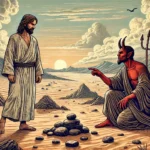Paradise Lost, an epic poem by John Milton, first published in 1667, is widely regarded as one of the greatest works of English literature. The poem explores the Biblical story of the Fall of Man, detailing the rebellion of Satan, the temptation of Adam and Eve, and their eventual expulsion from Eden. Written in blank verse, Milton’s work grapples with themes of free will, obedience, and redemption. Through grand and vivid language, it reflects on humanity’s place in the universe and attempts to “justify the ways of God to men.”
Plot Summary
In the realm of eternal light and harmony, Satan, once the most radiant of angels, seethed with envy and pride. His ambition drove him to challenge the sovereignty of God, gathering a legion of rebellious angels to wage war in Heaven. But God’s might was unmatched, and with a devastating thunder, Satan and his followers were cast down from the celestial heights, hurled into the abyss of Hell, a fiery wasteland of despair. There, amidst the inferno, Satan roused his fallen comrades. Though broken, his spirit remained unyielding. As he looked out over the desolate landscape, he resolved that it was “better to reign in Hell than serve in Heaven.” With Beelzebub at his side, Satan rallied the fallen angels to continue their rebellion by a subtler means: they would corrupt God’s newest creation—Man.
Satan embarked on a perilous journey through the dark, chaotic void that separated Hell from Heaven. After navigating the treacherous regions of Chaos and Night, he arrived at the gates of the new world—a paradise crafted with divine beauty, where Earth was a garden of life and light. Guarding the entrance to this world were two formidable beings: Sin, Satan’s own offspring, and Death, their monstrous child. With cunning persuasion, Satan convinced them to grant him passage, and he slipped into the newly created Eden, where he would lay his plans to subvert the innocence of mankind.
In Heaven, God foresaw Satan’s scheme but chose not to intervene directly. He valued the free will given to his creations, knowing that without the capacity to choose, love and obedience would be hollow. His Son, the embodiment of divine love, offered Himself as a future sacrifice to redeem humankind, once they fell from grace.
Meanwhile, in the lush gardens of Eden, Adam and Eve lived in harmony with nature, each other, and their Creator. They were free to enjoy all the bounty of the Earth, save one restriction: they were forbidden to eat from the Tree of Knowledge. The first man and woman shared a profound love, their souls united in purity, unaware of the malice that crept toward them.
Satan, in the guise of a serpent, slithered through the garden’s boughs, watching his prey. He observed the innocence of Eve and recognized in her curiosity an opportunity. While Adam and Eve worked separately, Satan approached Eve as she wandered, subtly weaving words of flattery and temptation. He spoke of the forbidden fruit and how it could unlock divine knowledge, making them as gods. Though hesitant, Eve’s desire for wisdom swelled. Her innocence gave way to temptation, and she plucked the fruit from the Tree of Knowledge, eating of it. In that moment, the universe trembled, and the Fall of Man began.
Eve, now burdened with the knowledge of good and evil, felt a wave of shame and fear. She sought out Adam, who, out of his deep love for her, chose to share her fate. Though he knew the gravity of the sin, he could not bear the thought of losing her. Together, they consumed the fruit, and in an instant, their pure, idyllic world transformed. Shame and guilt clouded their hearts, and for the first time, they felt the weight of mortality.
As night fell, they hid themselves in fear, but God’s presence could not be evaded. Confronted with their disobedience, Adam and Eve confessed their transgression. Though saddened, God passed judgment. The serpent, once a beautiful creature, was condemned to crawl upon its belly for eternity. Eve’s punishment would be pain in childbirth and subjugation to her husband, while Adam’s fate was to toil and labor the cursed ground for sustenance. They were banished from Eden, no longer able to dwell in the presence of divine perfection.
Yet, even in His justice, God offered mercy. The Son, who had witnessed the Fall with compassion, promised that humanity would one day be redeemed. Though Adam and Eve would suffer the consequences of their actions, their descendants would have the chance for salvation through the future sacrifice of the Son, who would defeat sin and death.
As Adam and Eve prepared to leave Eden, the archangel Michael descended to lead them away. Though Adam was initially filled with despair, Michael offered him a vision of the future. Adam saw the trials and tribulations that would befall his offspring, from the murder of Abel by Cain to the rise and fall of empires. But amidst the suffering, there was hope. Michael showed him the coming of a Savior, a Redeemer who would restore humanity’s lost grace.
With these revelations, Adam’s heart was comforted. Though he and Eve were cast out of Eden, they carried with them the knowledge that their suffering was not the end, but the beginning of a long path toward redemption. Hand in hand, they left the gates of Paradise, walking into a world of hardship, yet with the promise that one day, mankind would be reconciled with God.
Main Characters
Satan – The tragic anti-hero of Paradise Lost, Satan is a complex character driven by ambition, pride, and defiance. After being cast out of Heaven for rebelling against God, he plots his revenge by corrupting God’s newest creation, humanity. His character arc explores themes of rebellion, despair, and the perils of unchecked ambition.
Adam – The first human, created by God, Adam is a symbol of innocence and reason. He represents humanity’s potential for both greatness and fallibility. His relationship with Eve and his eventual decision to disobey God’s command after being tempted illustrate the complexity of human free will and love.
Eve – Created from Adam’s rib, Eve embodies beauty and grace. Although she is devoted to Adam, her curiosity and susceptibility to temptation lead to her pivotal role in the Fall. Her desire for knowledge and independence reflects themes of agency and consequence.
God – Milton’s depiction of God is that of an omnipotent and just ruler. Though He foresees the Fall, He allows it to happen as a testament to the gift of free will granted to His creations. God’s justice and mercy are central to the narrative’s theological underpinnings.
The Son (Jesus) – The Son of God plays a redemptive role in Paradise Lost. He offers Himself as a sacrifice to atone for humanity’s sin, embodying divine mercy and love. His eventual triumph over Satan emphasizes the theme of redemption.
Theme
Free Will and Predestination – One of the central themes is the balance between free will and divine foreknowledge. Milton wrestles with the idea that although God knows the outcome of events, humans and angels are still endowed with the ability to make choices, making them accountable for their actions.
Obedience and Rebellion – The contrast between obedience to divine authority and rebellion against it forms the core of the narrative. Satan’s revolt against God and Adam and Eve’s disobedience serve as examinations of pride, authority, and the consequences of defiance.
The Nature of Good and Evil – Milton explores the origin of evil through Satan’s transformation from a powerful archangel into the embodiment of sin and rebellion. The poem investigates how evil can arise from ambition and envy and challenges the notion of evil as an absolute force.
Innocence and Experience – The loss of innocence is a significant motif. Adam and Eve’s life in Eden represents an ideal state of purity and harmony, which is shattered by their act of disobedience. This fall into knowledge and experience introduces suffering, death, and the need for redemption.
Redemption and Sacrifice – Even as the poem dwells on the fall of humankind, it offers hope through the promise of redemption. The Son’s willingness to sacrifice Himself for humanity’s sins foreshadows the Christian narrative of salvation.
Writing Style and Tone
Milton’s writing in Paradise Lost is characterized by its majestic and elevated style. He employs blank verse, unrhymed iambic pentameter, which lends the poem a formal and grandiose quality, mirroring the epic traditions of Homer and Virgil. Milton’s language is dense and rich with classical allusions, theological references, and philosophical musings. His sentences often unfold in long, complex structures, requiring readers to pay close attention to his intricate use of metaphor, simile, and allegory.
The tone of Paradise Lost is both solemn and reflective. Milton approaches his subject matter with a gravity befitting the epic nature of the story. Themes of divine justice, the fallibility of man, and the cosmic struggle between good and evil are treated with deep intellectual rigor. At the same time, there is an undercurrent of empathy, particularly in the portrayal of Adam, Eve, and even Satan. Their struggles evoke a sense of tragic inevitability, making the reader contemplate the weight of moral decisions and the possibility of grace.
We hope this summary has sparked your interest and would appreciate you following Celsius 233 on social media:
There’s a treasure trove of other fascinating book summaries waiting for you. Check out our collection of stories that inspire, thrill, and provoke thought, just like this one by checking out the Book Shelf or the Library
Remember, while our summaries capture the essence, they can never replace the full experience of reading the book. If this summary intrigued you, consider diving into the complete story – buy the book and immerse yourself in the author’s original work.
If you want to request a book summary, click here.
When Saurabh is not working/watching football/reading books/traveling, you can reach him via Twitter/X, LinkedIn, or Threads
Restart reading!








